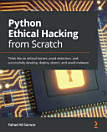Darkweb Cyber Threat Intelligence Mining
About this ebook
About the author
John Robertson is a student at Arizona State University pursuing undergraduate degrees in both Computer Science and Electrical Engineering, where his work was nominated for the Computing Research Association's Outstanding Undergraduate Researcher award. He is a recipient of an ARO Undergraduate Research Apprenticeship Program grant as well as two Fulton Undergraduate Research Initiative grants for his work involving the application of artificial intelligence techniques to cyber-security problems in the Cyber-Socio Intelligent System Laboratory with Dr Paulo Shakarian. Robertson also has industry experience as a software engineering intern with Microsoft on the Windows Core Development team.
Ahmad Diab is a Computer Engineering Ph.D. student at Arizona State University. His current work in the Cyber-Socio Intelligent System Laboratory focuses on the application of AI techniques to cyber-security problems. Diab is a recipient of the SIPGA award from ASTAR agency, Singapore. Previously, he was a Java developer at EtQ compliance Company. He holds a B.Sc. in computer engineering from Jordan University of Science and Technology.
Ericsson Marin is a Computer Science Ph.D. student at Arizona State University. He works at the Cyber-Socio Intelligent System Laboratory under the guidance of Dr Paulo Shakarian, with research projects in the intersection of Social Network Analysis, AI and Cyber-Security. He received his M.Sc. in Computer Science from the Federal University of Goias, Brazil and has published numerous papers in the area of social network analysis. He also has real-world experience as a software designer managing different software factories. In 2015, Marin was awarded with a Brazilian Science without Borders scholarship to pursue his Ph.D.
Eric Nunes is a Ph.D. student in the computer engineering program at Arizona State University. His research focuses on the intelligence techniques to cyber security problems. Previously, he was a Research Associate at the Brain Engineering Lab at Dartmouth College, New Hampshire. Nunes holds an M.Sc. in Electrical Engineering from Syracuse University, New York.
Vivin Paliath is a Computer Science Ph.D. student at Arizona State University. His research at ASU focuses on the application of artificial intelligence and game-theoretic techniques to cyber-security problems. Paliath received both his B.Sc. in Computer Engineering and M.Sc. in Computer Science from Arizona State University. He has over a decade of industry experience and is also currently working as a Senior Software Engineer at Infusionsoft, a company that develops marketing-automation software for small businesses.




